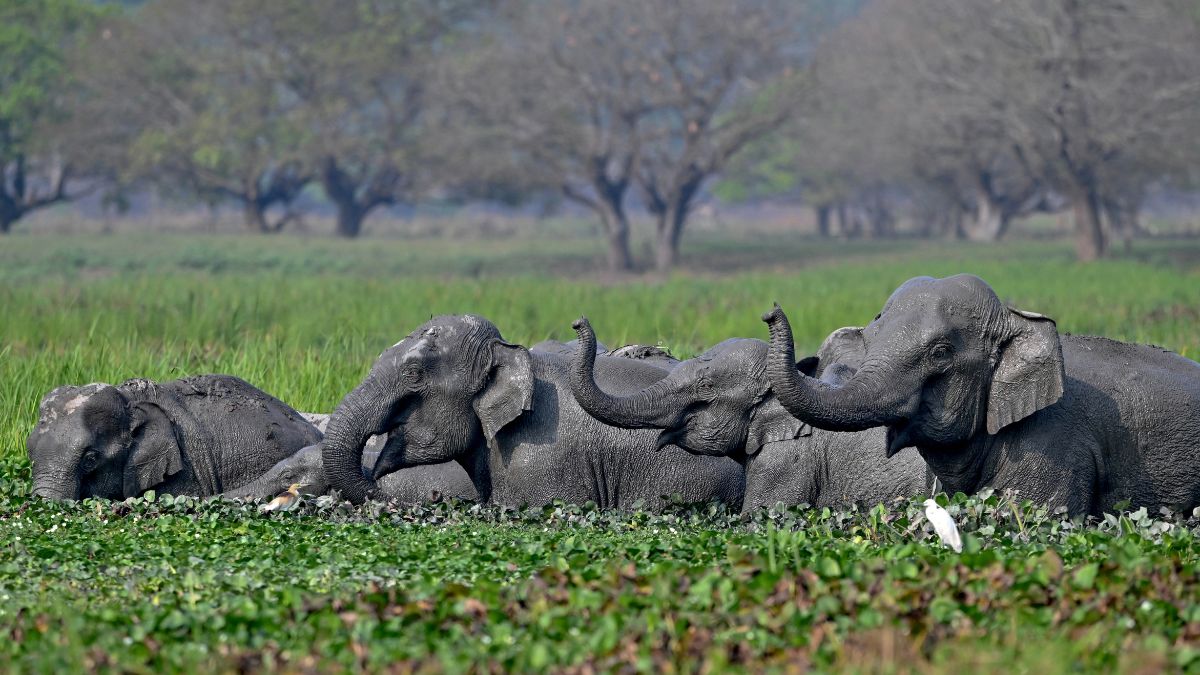World Elephant Day celebrated on August 12 puts focus on the need to conserve the tuskers around the globe. These giant animals are considered “architects” of the wild.
Elephants play a big role in seed dispersal in tropical forests, pollination, and improving the soil’s fertility. They are necessary for the existence of forests, which provide basic needs of humans, noted Down to Earth.
In India, these creatures hold great significance and are even considered a sacred symbol in Hindu and Buddhist religions. However, these animals face a looming threat – trains.
Let’s take a closer look.
Elephants in India
India hosts about 29,964 elephants, as per the latest census conducted in 2017. The government data shows the country has over 60 per cent of the world’s wild Asiatic elephant population.
Asian elephants are classified as endangered. As per the International Union for Conservation of Nature (IUCN) assessment in 2019, there are about 40-50,000 such tuskers in the wild globally.
In India, the loss of elephants due to train collisions is concerning. As per official data, as many as 200 jumbos died in train accidents in the past 10 years.
Last December, a pregnant elephant and her female calf were hit by a train when they were crossing a track near Jim Corbett National Park in Uttarakhand’s Haldwani. While the mother was killed, the baby named Bani was left paralysed in her two hind limbs.
Quick Reads
View AllExperts from the NGO Wildlife SOS, who are caring for Bani, say her condition is gradually improving.
“Bani may have to live her life with a handicap but with each day, you can see her becoming less scared and more playful. She loves her bananas and is quite a drama queen, [having tantrums] if she doesn’t get them,” Kartick Satyanarayan of Wildlife SOS told The Guardian in April.
What are authorities doing?
The state and central governments are taking steps to curb the incidents of elephants being hit by trains.
Tamil Nadu has deployed an AI-based surveillance system to prevent the death of elephants on railway tracks. This comes as these tragedies are rising in the southern state, with 36 such casualties reported in the past decade, as per official data.
Sensors near railway tracks alert railway administration and the forest department about elephant movement, which helps in avoiding accidents, reported BBC.
According to Supriya Sahu, secretary of the Tamil Nadu Forest Department, 400 instances of elephant movement near railway tracks have been recorded since the project’s roll-out in February.
“Technological interventions significantly reduce train-related accidents involving wildlife,” Sahu told BBC.
In November 2023, Railways minister Ashwini Vaishnaw announced the application of an AI-based surveillance system – called Gajraj – on a 700-km track across states in the next seven to eight months to prevent elephant deaths.
“This is 99.5 per cent error-free and works on pressure waves. This helps in detecting elephant movements near tracks, which helps the loco pilot to control his speed at least 200 metres before the point where the animal is crossing,” he said at the time.
Uttarakhand’s forest department is using drones to monitor elephant movement.
States are also building ‘animal flyovers’ to offer a safe passage for wildlife. As The Guardian mentioned, West Bengal has a flyover covered with bamboo and banana trees to encourage jumbos to use it and safely cross rail tracks.
In June, Karnataka got its first elephant overpass to ensure the safe crossing of the giant animals from the Bannerghatta National Park to Savandurga forest.
ALSO READ: World Elephant Day: 9 wildlife sanctuaries to sight giant tuskers
What can be done?
There are challenges to implementing safety measures to prevent elephant deaths in train collisions.
Indian Railways spans 130,000 km of track across the country. Many railway lines pass through forested habitats, cutting through the vital elephant corridors.
A set of guidelines titled Handbook to mitigate the impacts of roads and railways on Asian elephants prepared by IUCN specialist groups recommends evaluating the environmental and social impact on the habitat, wildlife, pollinators, and the social well-being of local communities whenever new roads, railway lines and other linear structures are planned, particularly where wildlife will be affected.
Vivek Menon, executive director of Wildlife Trust of India and a councillor of IUCN, told Mongabay-India in May that development takes priority over conserving biodiversity worldwide. “The way the two can be managed in this instance is to use such guidelines in allowing right of passage of this wonderful animal, the elephant, while allowing for critical road or rail projects to come up where needed and where (it is) ecologically suitable,” he said.
An expert suggests restricting train operations during the night to prevent elephant deaths. A study on the frequent train collisions involving tuskers found that most accidents took place between 6 pm to 6 am.
“Reducing the operation of trains during the night to the barest minimum is one way to avoid this situation. Railway authorities should see to it that the speed of the trains that pass through forests in which wild animals reside, is regulated between sunset and sunrise. A minimum speed of 30 kilometres/hour is to be maintained when trains pass through dense forests at night. Utmost care should be taken at vulnerable sections,” V Sundararaju, the president of the Society for Conservation of Nature, Trichy, Tamil Nadu, wrote for Down to Earth in 2019.
He also called for building overpasses or underpasses where elephant corridors and railway tracks intersect. Signboards, surveillance cameras and wireless sensors can be installed at accident-prone sites, as per Sundararaju.
“The forest is their home and the trains are invading their homes. Urgent installation of AI-enabled accident prevention systems and strict implementation of speed controls will save hundreds of elephants,” Satyanarayan of Wildlife SOS told The Guardian.
Steps can be taken to curb the jumbos’ movement across tracks by ensuring food and water for them inside the forests so they do not have to wander.


)

)
)
)
)
)
)
)
)



